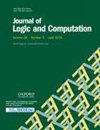偏类型理论中的完全性
IF 0.7
4区 数学
Q3 COMPUTER SCIENCE, THEORY & METHODS
引用次数: 0
摘要
本文为部分类型理论中的高阶逻辑系统提供了一个完备的证明。该框架是蒂奇对丘奇简单类型理论的扩展,并配备了他创新的自然推理系统。该系统将全部和部分(多参数)函数作为映射进行处理,并容纳到达框架的各种对象的算法计算。函数的偏性或计算的失败不是由假定的零对象(如第三真值)来表示的。该系统的逻辑运算符是经典的。这种表达系统的另一个受欢迎的特点是其结果关系是单调的。本文章由计算机程序翻译,如有差异,请以英文原文为准。
Completeness in partial type theory
The present paper provides a completeness proof for a system of higher-order logic framed within partial type theory. The framework is a modification of Tichý’s extension of Church’s simple type theory, equipped with his innovative natural deduction system in sequent style. The system deals with both total and partial (multiargument) functions-as-mappings and also accommodates algorithmic computations arriving at various objects of the framework. The partiality of a function or a failure of a computation is not represented by a postulated null object such as the third truth value. The logical operators of the system are classical. Another welcome feature of this expressive system is that its consequence relation is monotonic.
求助全文
通过发布文献求助,成功后即可免费获取论文全文。
去求助
来源期刊

Journal of Logic and Computation
工程技术-计算机:理论方法
CiteScore
1.90
自引率
14.30%
发文量
82
审稿时长
6-12 weeks
期刊介绍:
Logic has found application in virtually all aspects of Information Technology, from software engineering and hardware to programming and artificial intelligence. Indeed, logic, artificial intelligence and theoretical computing are influencing each other to the extent that a new interdisciplinary area of Logic and Computation is emerging.
The Journal of Logic and Computation aims to promote the growth of logic and computing, including, among others, the following areas of interest: Logical Systems, such as classical and non-classical logic, constructive logic, categorical logic, modal logic, type theory, feasible maths.... Logical issues in logic programming, knowledge-based systems and automated reasoning; logical issues in knowledge representation, such as non-monotonic reasoning and systems of knowledge and belief; logics and semantics of programming; specification and verification of programs and systems; applications of logic in hardware and VLSI, natural language, concurrent computation, planning, and databases. The bulk of the content is technical scientific papers, although letters, reviews, and discussions, as well as relevant conference reviews, are included.
 求助内容:
求助内容: 应助结果提醒方式:
应助结果提醒方式:


